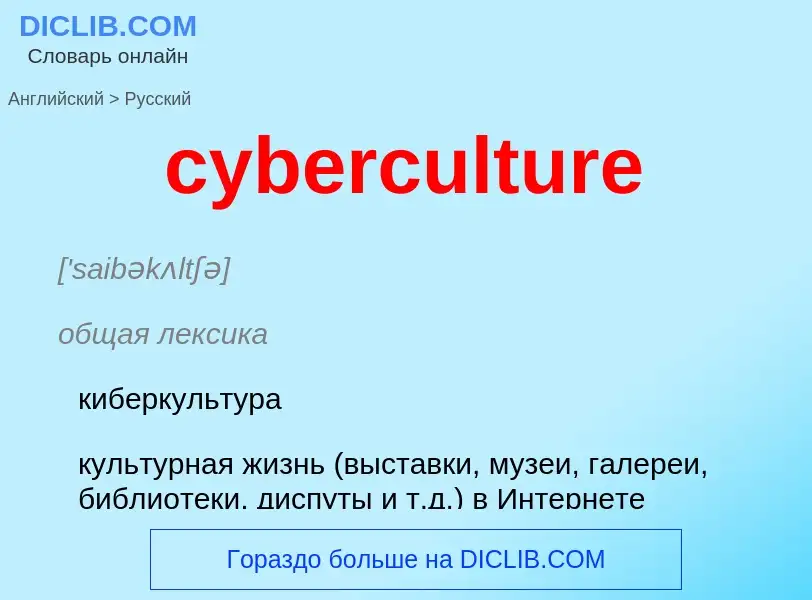Перевод и анализ слов искусственным интеллектом ChatGPT
На этой странице Вы можете получить подробный анализ слова или словосочетания, произведенный с помощью лучшей на сегодняшний день технологии искусственного интеллекта:
- как употребляется слово
- частота употребления
- используется оно чаще в устной или письменной речи
- варианты перевода слова
- примеры употребления (несколько фраз с переводом)
- этимология
cyberculture - перевод на русский
['saibəkʌltʃə]
общая лексика
киберкультура
культурная жизнь (выставки, музеи, галереи, библиотеки, диспуты и т.д.) в Интернете
существительное
общая лексика
кибернетическая цивилизация
«киберкультура» (с полностью автоматизированной промышленностью)
['rautlɪdʒ]
общая лексика
"Раутледж" (лондонское издательство; выпускает преим. социально-политическую литературу. Основано в 1834)
Википедия

Internet culture is a quasi-underground cyberculture developed and maintained among frequent and active users of the Internet (netizens, or digital citizens) who primarily communicate with one another online as members of online communities; that is, a culture whose influence is "mediated by computer screens" and Information Communication Technology,: 63 specifically the Internet.
The Internet is one of the most popular forms of communication today with billions of people using it every day. This is because the Internet is full of a wide variety of tools that can allow for information retrieval and communication, which can occur between individuals, groups, or even within mass contexts. It has created a culture that many people are involved in which has led to countless positive and negative impacts.
The Internet provides an array of tools for people to use for information retrieval and communication in individual, group, and mass contexts.
Internet culture arises from the frequent interactions between members within various online communities and the use of these communities for communication, entertainment, business, and recreation. The earliest online communities of this kind were centered around the interests and hobbies of anonymous and pseudonymous users who were early adopters of the Internet; typically those with academic, technological, highly niche, or even subversive interests..
The encompassing nature of the Internet culture has led to the study of its many different elements such as anonymity/pseudonymity, social media, gaming and specific communities, and has also raised questions about online identity and Internet privacy.





